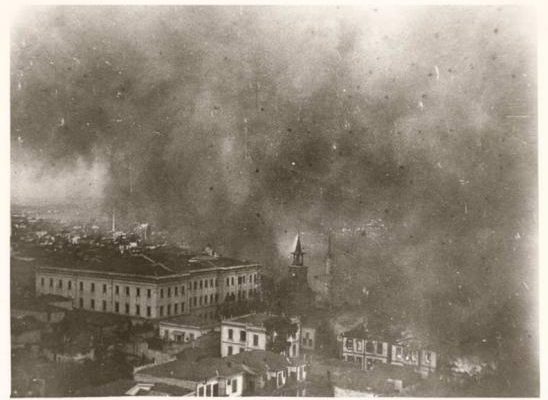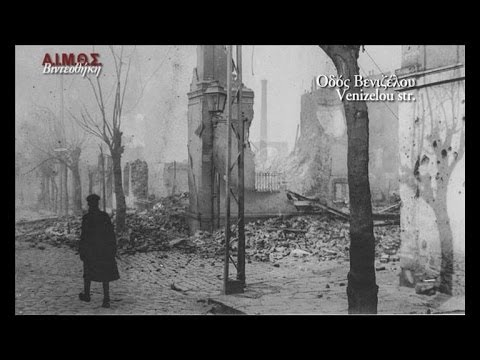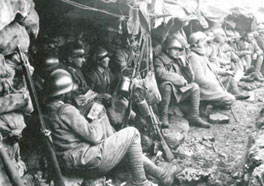The Terrible Tragedy of Salonica.
More Useless Fighting in the Alps;
A Singer Loses His Voice.
Special to The Great War Project.
(27 August) A true disaster hit the Salonica front (now Thessaloniki, Greece) in these days one hundred years ago.
A disastrous fire breaks out on August 18th – cause unclear – in the town of Salonica. Italian troops there joined Allied troops stationed there to try to put it out.

The great fire.
That proved beyond the capacity of the troops turned firefighters.
“Nearly half the city was burned down,” reports historian Martin Gilbert, “and 80,000 people were made homeless. The British base headquarters were destroyed.”
And, reports Gilbert, “as were almost all the stocks of quinine, needed to fight the scourge of the Salonica Front, the malarial mosquito.”
A munitions store filled with grenades had also blown up.

Aftermath of the Great Fire.
Salonica held many pleasures for the Allied troops passing through – reports one historian. “It was still possible to enjoy the natural beauty of the Gulf and to find some peace in the hills beyond the town. But there were many high spirits who looked for something noisier. That had gone up in smoke.”
“For the rest of the campaign,” reports Gilbert, “Salonica remained a desolate place.” Almost half the city burned down, writes one witness, Australian Olive King. “It will take the best part of two weeks to put the fire out and the city will remain a sooty ruin for the rest of the war.”
“The Salonica that existed before the war will never be rebuilt.”
The Salonica explosion coincided with the opening of another Italian offensive in the Balkan mountains, fought over by the Italians and the Austrians. And again, after several offensives in the Alps, it looked like the Italians held the upper hand.
“Since the launching of their new attack,” reports Gilbert, “the Italians had captured five mountain peaks and taken more than 20,000 Austrians and some German prisoners. Among those brought into British nurse Helen D’Abernon’s casualty clearing station was a tenor from the Hanover Opera House.”
She writes: “His poor face was concealed by a sanguinary mass of bandages. It was only possible to give nourishment by means of an india-rubber tube passed underneath.”
“It seemed as though gangrene has already set in, yet he wrote down an anxious enquiry as to whether we thought he would ever be able to sing again.”
Around the same time, she wrote in her diary, “The stream of sick and wounded has swollen to a flood.” At this moment a century ago, some 4,000 Austrians had passed through, “on their way to being interned behind barbed wire.”

Italian troops in the Alpine trenches.
But she writes: “they seemed in good spirits and were laughing and singing in snatches. Internment, a serious deprivation of liberty in peacetime, meant life in wartime.”
Reports historian Gilbert, “The Austrians withdrew to a new line. Italy had gained six miles of mountainous terrain. But there was a dark side also for the Italians. A growing number of desertions, estimated at more than 5000 earlier in the summer and a further 5,000 in August.
On the Western Front at this moment, the British faced terrible losses. For gaining a mere 880 yards, they faced the total casualty figure of more than 60,000 in three weeks.
Writes historian Gilbert, “For the British it was a terrifying heavy toll. For the Germans, who had once more beaten back a sustained and numerically massive attack, it was a triumph.”
